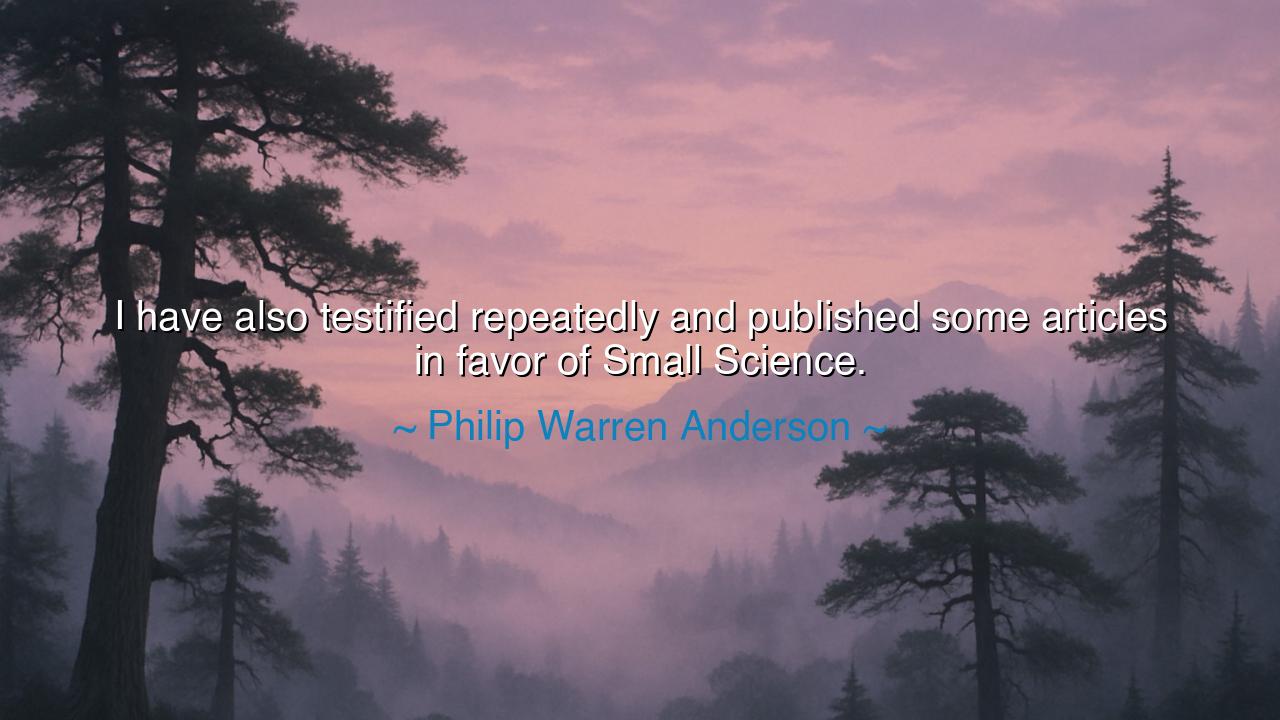
I have also testified repeatedly and published some articles in
I have also testified repeatedly and published some articles in favor of Small Science.






Hear me, O Seekers of Knowledge and Wisdom, for the words of Philip Warren Anderson speak to the very heart of scientific discovery: "I have also testified repeatedly and published some articles in favor of Small Science." These words carry profound meaning for our time, for they remind us that great discoveries are not always born from vast, monumental projects but from the humble, intimate pursuit of knowledge—what Anderson refers to as Small Science. Science is often thought of as a grand pursuit, one that requires massive institutions, enormous budgets, and large teams. But Small Science—those individual, focused efforts that delve into the specific and the detailed—can be just as powerful, if not more so, in advancing our understanding of the world.
In the time of the ancients, when Aristotle and Pythagoras walked the earth, science was not a field of vast institutions and sprawling laboratories. It was the pursuit of knowledge by individuals, often working alone or in small groups, seeking answers to the mysteries of the world around them. Small Science, in this sense, is the very essence of what it means to be a true seeker. The ancient philosophers and early scientists did not have the tools or resources that we have today, but they had something even more important: curiosity, dedication, and a willingness to explore the small corners of the world with great care.
Anderson’s praise of Small Science is not a rejection of grand projects but a call to honor the power of the individual and the small-scale endeavor. Think, O Children, of the story of Marie Curie, whose groundbreaking work in radioactivity began not in a grand laboratory, but in a humble space where she worked tirelessly, often with little more than her own hands and a few tools. Her discoveries changed the course of science, not because she had vast resources, but because she had focus, passion, and a commitment to the details. Her work was Small Science at its core, and yet it had monumental consequences for medicine, physics, and our understanding of the natural world.
In modern science, we often look to the great institutions—the CERN particle accelerator, the massive projects of space exploration, the sprawling hospitals that research cures for diseases—but Anderson’s words remind us that Small Science can also yield great truths. It is in the quiet, focused exploration of specific questions—those that might seem minor in the grand scheme—that we often uncover the most profound insights. Take, for instance, the work of Gregor Mendel, who, with little more than a garden and a keen mind, unlocked the fundamental principles of genetics. His experiments with pea plants did not require grand funding or large teams. It was his attention to detail, his patience, and his focused study that changed the way we understand inheritance and the genetic code.
The lesson here, O Seekers, is this: Science is not about the size of the project but the depth of the inquiry. The greatest advancements in human understanding have often come not from vast, collaborative endeavors but from individuals who were willing to focus on the small details and explore them with a dedication that transcends scale. Whether in the laboratory, the field, or even in the mind, it is the commitment to asking specific questions and seeking exact answers that propels us forward.
In your own lives, take this lesson to heart. Whether you are a scientist, an artist, or a seeker in any field, remember that great achievements come from the ability to focus deeply on the task at hand. Small Science teaches us that the road to discovery is often a series of small, deliberate steps. It is the quiet, persistent pursuit of truth—whether through careful experimentation, thoughtful observation, or the honing of a craft—that leads to great understanding. Seek not the grandeur of the project, but the depth of the inquiry.
Let us not forget the importance of Small Science in shaping the world. For it is in the small, intimate spaces of human inquiry, where the heart and mind are united in a single purpose, that we find the true essence of knowledge. Focus your efforts, pay attention to the details, and trust that even the smallest pursuit of truth can lead to discoveries that change the course of history. Whether you stand on the shoulders of giants or walk your own quiet path, remember that greatness is often hidden in the small, in the personal, in the quiet dedication to the craft of understanding. Embrace the power of Small Science, for in it lies the potential for greatness.






AAdministratorAdministrator
Welcome, honored guests. Please leave a comment, we will respond soon